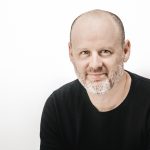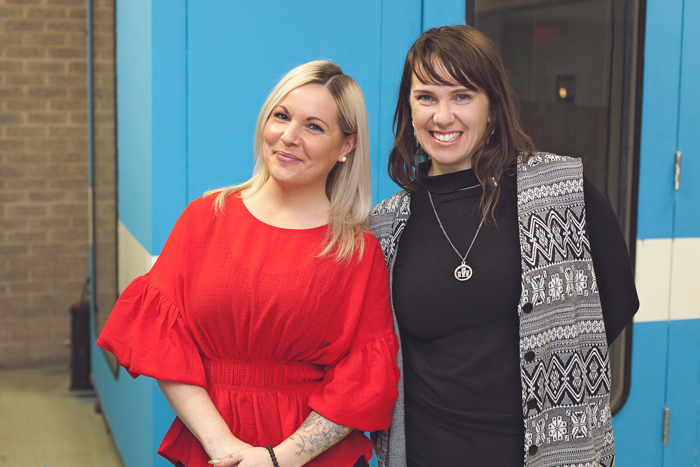Students learn to better communicate, develop their critical thinking, find their “voice,” and improve their literacy.
Related pages
- A partnership to promote early childhood literacy
- Filling bellies to keep kids in school
- Literacy project creates magical moments for students
- Strong communities working to keep girls in school
- Supporting students who re-engage with school
- Understanding youth to smooth their transition to high school
- When schools and the business sector work together, youth benefit
The W.O.R.D. program at Montréal’s James Lyng High School
Words that resonate for a school and its community
In 2006, the ministère de l’Éducation du Québec created Community Learning Centers (CLCs) to help English-language schools build partnerships within their communities that support student success and contribute to the vitality of English-speaking communities.
In schools supported by CLCs, a community development agent works closely with the principal and staff to create mutually beneficial partnerships with community organizations, municipalities, local businesses, families, and members of the community. In 2006, James Lyng High School, in Montréal’s Sud-Ouest borough, was one of the first schools to benefit from the CLC initiative – today there are 80! With CLC support, the school teamed up with Writing Our Rhymes Together (W.O.R.D.) in 2008, a program founded by Lynn Worrell.
Mikaella Goldsmith and Lynn Worrell
(Photo: François Couture)
“Ten years ago, it seemed to me that the education system tended to value only certain types of learning and knowledge. And I came to realize that kids felt a lot of pressure in that kind of environment – it’s very hard to absorb subject matter in those conditions. That was my thought process leading up to the creation of the W.O.R.D. program,” relates Worrell.
Finding their voice
Youth taking part in W.O.R.D. compose hip-hop lyrics and music. This teaches them, among other things, to better communicate, develop their critical thinking, find their “voice,” and improve their literacy. In other words, it enhances their ability to understand and use written information in their everyday lives.
“We’ve even seen a science teacher have his students write lyrics to help them remember subject matter. It’s wonderful!”
Mikaella Goldsmith is the community development agent at the James Lyng High School CLC. She feels that the partnership with W.O.R.D. has been fruitful in several respects: “First, in addition to improving literacy, the program encourages student engagement in the school through extracurricular activities. Also, by developing strong relationships with adult mentors who believe in them, our students gain confidence and a desire to make their voices heard – at school initially and then in other areas of their lives. And, in partnership with Lynn, we further developed the program into a general teaching resource, so now all students in the school are involved in some way with W.O.R.D. That may sound obvious for subjects like music and language, but we’ve even seen a science teacher have his students write lyrics to help them remember subject matter. It’s wonderful! In 2013 the administration decided to give James Lyng an “urban arts” vocation, and W.O.R.D. was one of the first, if not the first program that allowed us to do that. So I guess you might say that W.O.R.D. is firmly rooted here; it’s part of our school’s DNA.”
Better together
While W.O.R.D. has been hugely beneficial for Mikaella Goldsmith and the students at James Lyng, the reverse is also true, as Worrell points out. “It’s thanks to Mikaella and the CLC that we’re still here 10 years later! You can have a great program like W.O.R.D., but it can be hard to know who to talk to in the education system or a school to promote it. The CLC is a facilitator. It points us to the right ears. It’s seen the value of our work over the past decade. We’ve built a very strong relationship, and I’d even say that the CLC comes to our defence when we need it.”
The bonds of loyalty and trust between the school and the W.O.R.D. program – clearly seen in the obvious affinity between Worrell and Goldsmith – have been very beneficial in recent years.
First, the pair convinced McGill University’s Department of Education to apply (successfully!) for a research grant, which partially funded a magnificent recording studio for the W.O.R.D. program’s budding artists.
And recently, the instructors who had been there since the project started ten years ago retired and had to be replaced. But the transition, which could have been catastrophic for both students and the program, happened gradually and symbiotically.
“I’m very much a mother hen when it comes to ‘my kids,’ admits Goldsmith. If Lynn had hired people without talking to me first, we might have ended up with instructors who weren’t to the students’ liking or who couldn’t understand their realities, and that would have jeopardized the whole program. But because I can talk openly and honestly with Lynn, and she values my opinion, we were able to make enlightened decisions that worked for everyone.”
But ultimately, it’s the students who benefit most from this affinity. One can’t help but envy their opportunity to write lyrics with mentoring artists, create rap beats, record their songs in a well-equipped studio, transfer them onto an annual “mix tape” that is distributed in the school, film videos, and learn about the ins and outs of the recording industry.
And during this entire creative process, they blossom and form healthy relationships with other students and adults – not to mention getting the best grades in the school.
“I’ve had language arts teachers tell me that their students write better because of W.O.R.D.”
“I remember one student in the program in the late 2000s who was literally obsessed with hip hop,” recounts Worrell. “He had amazing flow – a real talent. One day, I’m strolling through the crowds at the Montréal International Jazz Festival and I see him up on stage singing. I was so proud!” And, as Goldsmith adds, “that’s just one story among so many others. I’ve had language arts teachers tell me that their students write better because of W.O.R.D. We’ve had former participants become mentors for the summer program we offer to young adults in the neighbourhood. One former participant sang at the Women’s March. Sometimes, the program’s effects aren’t visible right away – we plant the seeds and we never know how the plant will grow afterward.”
_ February, 2018
 Réseau réussite Montréal is continuing its series of feature articles on fruitful collaborations between the education sector and community partners that foster the success of youth.
Réseau réussite Montréal is continuing its series of feature articles on fruitful collaborations between the education sector and community partners that foster the success of youth.
We asked journalist and photographer François Couture to go and meet the people involved in these partnerships and tell their stories.





